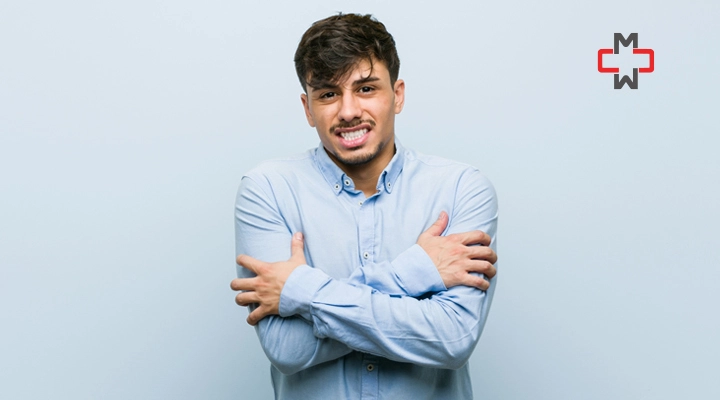Have you ever found yourself looking for a sweater or shivering unexpectedly, right after having a meal? – Questioning ‘Why am I feeling cold after eating?’
It might seem odd, feeling cold after eating, but you’re not the only one. Many people experience this unusual problem and wonder why they’re feeling cold after eating.
In today’s blog, we will explore the answer to ‘Why do I get cold after I eat?’ – and offer a few practical tips to help you stay warm.
Why Do I Get Cold After I Eat?
Various factors can lead to feeling cold after eating. Understanding these causes can help you manage this uncomfortable sensation better.
1) Low-Calorie Diet
A low-calorie diet can significantly impact your body’s ability to generate heat. Calories provide the energy your body needs to perform various functions, including maintaining a stable internal temperature. When you consume fewer calories than your body requires, it might conserve energy by reducing heat production, making you feel cold after eating.
2) Intermittent Fasting
Intermittent fasting involves cycles of eating and fasting, which can also influence your body temperature. During the fasting period, your body may lower its metabolic rate to conserve energy. This reduction in metabolism can make you feel cold after eating, as your body slowly ramps up its energy production.
3) Eating Spicy Food
While it might seem counterintuitive, eating spicy foods can sometimes make you feel cold after eating. Spicy foods initially raise your body temperature by stimulating circulation and increasing sweat production. As the sweat evaporates, it can leave you feeling cold.
Additionally, the body may experience a temporary drop in temperature as it works to return to its baseline state after the initial spike caused by spicy foods.
4) Insulin Response
When you eat, especially foods high in carbohydrates, your body releases insulin to help manage blood sugar levels. Insulin can cause blood vessels to widen (vasodilation), leading to increased blood flow to the skin and extremities. This increased blood flow can result in heat loss from the body’s surface, making you feel colder.
5) Cold Foods and Drinks
Consuming cold foods and drinks can directly lower your body temperature. When you ingest something cold, your body has to expend energy to warm it up to your internal temperature. This process can temporarily make you feel cold, particularly if you consume large quantities of cold items in a short period.
6) Underlying Medical Conditions
Certain medical conditions can also make you more susceptible to feeling cold after eating. Conditions such as hypothyroidism (causing thyroid chills after eating), anemia, and Raynaud’s disease affect your body’s ability to regulate temperature.
If you’re consistently feeling cold after eating and have other symptoms, it may be worth consulting a healthcare provider to rule out any underlying issues.
How To Avoid Feeling Cold After Eating?
Here are some practical steps you can take to avoid feeling cold after eating:
1) Balanced Diet
Ensure that your diet is well-balanced and includes sufficient calories to meet your body’s energy needs. Incorporate a mix of carbohydrates, proteins, and healthy fats to help maintain stable energy levels and body temperature.
2) Gradual Changes in Diet
If you are practicing intermittent fasting or following a low-calorie diet, make changes gradually. Allow your body time to adjust to new eating patterns and metabolic rates, which can help mitigate the sensation of coldness.
3) Eat Warm Foods
Opt for warm or hot meals and drinks instead of cold ones. Soups, stews, and hot beverages can help maintain your body temperature and provide a warming effect.
4) Layer Clothing
Dress in layers, especially if you tend to feel cold easily. Wearing layers allows you to adjust your clothing as needed to stay comfortable after meals.
5) Stay Active
Engage in light physical activity after eating. A short walk or some gentle stretching can help stimulate blood flow and increase body temperature.
When To See a Doctor?
Feeling cold after eating is usually not a cause for concern. However, if this remains consistent and there are other symptoms too, such as fatigue, weight loss, or dizziness – it may indicate an underlying health issue.
You should consider setting an appointment at Manhattan Medical Arts if:
- The cold sensation is severe and interferes with your daily activities.
- You experience additional symptoms like fatigue, palpitations, or shortness of breath.
- There are signs of an underlying condition, such as thyroid chills after eating, anemia, or circulatory issues.
Frequently Asked Questions
Why do I get cold so easily?
You may feel cold easily due to a variety of factors, including a low-calorie diet, insufficient body fat, poor circulation, or an underlying medical condition such as anemia or hypothyroidism. Hormonal imbalances and certain medications can also contribute to increased sensitivity to feeling cold.
How to stop feeling cold?
To stop feeling cold after eating, make sure you have a balanced diet with enough calories, dress in layers, stay physically active, and consume warm foods and beverages. Managing stress and staying hydrated can also help maintain body temperature.
When should I be worried about chills?
You should be concerned about chills if they are persistent, severe, or accompanied by other symptoms such as fever, fatigue, unexplained weight loss, or dizziness. These could indicate an underlying health issue, such as an infection, thyroid chills after eating, or anemia.
Why am I always cold?
Feeling cold all the time can result from various factors, including low body weight, poor circulation, insufficient calorie intake, anemia, hypothyroidism, or hormonal imbalances.
– Disclaimer –
This blog is for informational & educational purposes only and does not intend to substitute any professional medical advice or consultation. For any health-related concerns, please consult with your physician, or call 911.
-
About The Author
Dr. Syra Hanif M.D.Board Certified Primary Care Physician
Dr. Syra Hanif is a board-certified Primary Care Physician (PCP) dedicated to providing compassionate, patient-centered healthcare.
Read More







